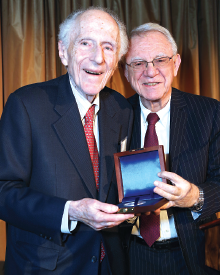Hamburgs Honored for Lifelong Dedication to Conquering Mental Illness
Abstract
Betty Hamburg, M.D., and David Hamburg, M.D., receive the 2015 Herbert Pardes Humanitarian Award for their unstinting efforts to reduce the stigma of mental illness, advance adolescent psychiatry, and speak out against genocide.
At the Brain and Behavior Research Foundation’s (BBRF) symposium last month in New York City, achievements in research were front and center; but later that day, the focus shifted to the people who helped make new breakthroughs in mental health possible.
For while private groups like the BBRF—which invests 100 percent of donor contributions into its NARSAD Grants—play pivotal roles in supporting research that might not be funded by traditional, federal grants, they require philanthropy to meet their goals, and that requires the efforts of people who are willing to tirelessly educate and advocate for the cause of mental health.
To honor people whose extraordinary contributions have greatly helped to advance the understanding of mental illness, the burden it places on individuals and society, and the need to expand mental health services around the world, BBRF inaugurated the Pardes Humanitarian Prize in Mental Health in 2014.
The award is named in honor of Herbert Pardes, M.D., a past president of APA and long-time advocate for people with mental illness. Pardes, president of the BBRF’s Scientific Council and executive vice chair of the Board of Trustees at New York-Presbyterian Hospital, was the award’s first recipient.

Former APA President Herbert Pardes, M.D., presents the Pardes Humanitarian Award to David Hamburg, M.D. He and his wife, Betty, received the prize for their 60 years of advocacy in mental health and violence prevention.
This year, during BBRF’s 28th Annual National Awards Dinner that followed the research symposium, Pardes had the honor of presenting his namesake award to Beatrix (Betty) Hamburg, M.D., and David Hamburg, M.D.
“David and Betty Hamburg are extraordinary individuals who have blended their scientific knowledge and profound compassion to raise our understanding of the behavioral aspects of medicine,” Pardes told Psychiatric News. “They have taught us about the importance of hope and respect, and using our knowledge toward the greater good for all humanity.”
“Through their work, Drs. David and Betty Hamburg have transformed our view of mental illness and their work has gone far to minimize its stigma,” said Jeffrey Borenstein, M.D., president and CEO of BBRF and editor in chief of Psychiatric News. “They represent the epitome of psychiatry not only for the mental health field, but for the world—they are true humanitarians.”
The Hamburgs started their intertwined careers shortly after meeting at Yale School of Medicine in 1948 (where Betty would become the school’s first African-American female graduate). After graduating, they went to the National Institute of Mental Health (NIMH), where they established the institute’s first clinical research center and began studying the role of stress in severe mood disorders.
Afterward, David Hamburg became chair of the psychiatry department at Stanford University, then director of health policy research and education at Harvard University, and then president of the Carnegie Corporation. (Along the way, he also served as president of the Institute of Medicine, National Academy of Sciences, and American Association for the Advancement of Science). He is currently the DeWitt Wallace Distinguished Scholar at Weill Cornell Medical College.
At the same time, Betty Hamburg was advancing the field of adolescent psychiatry when children’s mental health was profoundly neglected, first at Stanford and then at Mount Sinai and Cornell universities. Her groundbreaking work included the illumination of the critical role of early development in physical and mental health and the recognition of early adolescence as a distinctive developmental period.
In later years, ending violence has become a major cause for the Hamburgs. Betty has conducted research on the use of school-based programs as venues for conflict resolution and violence prevention and together with David published a book about violence and hate titled Learning to Live Together. David also wrote Preventing Genocide: Practical Steps Toward Early Detection and Effective Action and has chaired commissions for both the United Nations and the European Union to help deal with this pressing issue.
“We are deeply honored to receive the Humanitarian Prize from our dear friend and colleague, Herb Pardes,” David said as he reflected on the couple’s six decades of work (Betty was unable to attend due to illness). “It is especially meaningful for Betty and me to share this award for our work together, a lifelong effort to understand how human beings cope during the most difficult circumstances. This work has ever greater urgency in today’s world of strife and conflict.”
The foundation also recognized former first lady Rosalynn Carter with an “honorary tribute” for her tireless work in mental health advocacy, which has helped shape both positive public perception and public policy. Though she was also unable to attend, the former first lady thanked the BBRF in a videotaped interview. ■
More information on the Pardes Humanitarian Prize can be accessed here.



